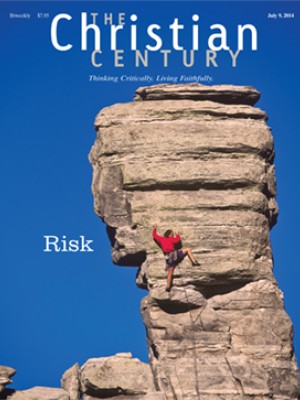Good news verbatim: Why we need clinical evangelistic education

At no time in my life have I felt more palpable anxiety than at the beginning of my experience of clinical pastoral education in seminary. My first visit with a hospital patient went something like this: I said, “Hi. I’m the chaplain on the floor today. What’s your name?” The patient said: “Oh—well, nice to meet you. I hope you have a wonderful day.” And then I hightailed it out of the room.
Thanks to clinical pastoral education, I did get better at this ministry. I learned how to sit in silence when necessary, how to offer prayers, how to be part of difficult conversations in fruitful ways.
Core to my learning was writing up and discussing verbatims—written records of conversations in the clinical setting that approximated the verbal back and forth of visits with patients. In reviewing verbatims, pastoral interns learn how to share and invite people into more meaningful conversations.
Read our latest issue or browse back issues.
The helpfulness of that experience has inspired the idea of another sort of clinical endeavor. The type of conversation that frequently terrifies me now is a little different, but I am no less awkward and no less in need of something like a verbatim to help me with it. Call the course I need CEE: clinical evangelistic education.
I frequently find myself sitting down over coffee with people who are trying to decide whether to affiliate with the church. Or I talk to people who are reflecting on the new faith arising in their minds and hearts and struggling with past experiences of abusive faith communities. CPE prepared me for these conversations to some degree. I know not to avoid aspects of conversations simply because they cause me discomfort. I know (at least intellectually) when to listen and when to advise. But I could be better at this—and much better, I think, if I had a community with which to analyze such conversations.
In his recent apostolic exhortation Evangelii Gaudium, Pope Francis writes, “We cannot forget that evangelization is first and foremost about preaching the gospel to those who do not know Jesus Christ or who have always rejected him. . . Christians have the duty to proclaim the gospel without excluding anyone. Instead of seeming to impose new obligations, they should appear as people who wish to share their joy, who point to a horizon of beauty and who invite others to a delicious banquet. It is not by proselytizing that the Church grows, but ‘by attraction.’”
I agree that this wide and capacious approach to a new evangelization is badly needed. It begins with one-on-one evangelical conversations, for which pastors have a special responsibility but at which many pastors are not especially good.
Though my own denomination, the Evangelical Lutheran Church in America, is increasingly committed to evangelism, it has a long way to go. We like to think we have an artistic and theologically nuanced approach to being evangelical. The truth is more likely that we are still weakly evangelical. And we are rarely if ever truly evangelical among communities culturally distant from us.
What if there were CEE programs to help us? Imagine being able to bring the verbatim of an evangelical conversation back to a group of trusted evangelizers and an experienced supervisor, asking: “What could have been done to make this conversation even more inviting, even more likely to share the life-giving message of Jesus Christ?”
Below are three sample verbatims (they are composites, edited to protect the identity of the participants), with the beginnings of an analysis.
Verbatim No. 1: On the sidelines at a sporting event
Pastor: Hey, great day for a game, eh?
Mom: Yeah. Finally some sun.
Pastor: Argh. Just realized I forgot our water bottles. Oh well. [pause] So I saw that you brought the kids for worship a few weeks ago.
Mom: We did.
Pastor: How has that been going for you?
Mom: We’ve enjoyed the times we’ve come.
Pastor: I saw you were with us a few weeks in a row. I wondered more recently how it was going.
Mom: To be honest, it’s nothing about church, but it’s just really hard to change our Sunday morning patterns. We’re interested, we’re just hard to stir on Sunday mornings.
Pastor: I get that. Routine is hard to change.
Mom: I fear we’ll always be a little spotty on attendance. Forgive us that.
Pastor: No worries. Just know you are welcome and invited.
Mom: I know, I know. We’re absolute heathens [with a smile]. We don’t do routine well, but we thrive when we do.
Pastor: You’re not heathens. There are a lot families that want to be together on the weekend. Lots of good options.
Mom: Yes. We’ll give it a try again. Thanks for asking.
Pastor: No problem.
This sideline conversation is probably the most common evangelistic conversation this pastor has. He’s engaging well-intentioned families that wish they could establish a new worship routine but are not able to get in the new groove. It happens to be the conversation with which he is the most dissatisfied.
His definition of being effective in this conversation would be to express the gospel in relation to worship attendance in a way that inspires the mom to engage her family more regularly in worship at his congregation.
He hopes to be evangelical rather than proselytizing or even mercenary. He wants the conversation to be good news. Hence his positive response to “We don’t do routine well, but we thrive when we do.” He would love to name Jesus more in the conversation, but he doesn’t know how to do it well. And he worries that the conversation might have caused the mom guilt or that he had the wrong motivations for the conversation.
Verbatim No. 2
Newly baptized Christian: Baptism was such a high moment. But now through the summer, I’ve just been feeling kind of low. I’ve started to have a lot of doubts.
Pastor: It’s not unnatural for people of faith to have doubts. I think that doubt is actually part of faith, intrinsic to it.
NBC: I guess so. But it’s like, I wonder, is any of it for real? Sometimes I don’t even know what I believe, or if I believe it.
Pastor: What would help?
NBC: That’s the thing. I wish I knew. I mean, it’s all so complicated. And then the fact that a lot of people around me either don’t believe it or are puzzled by my decision.
Pastor: Who do you have that you can talk to about this kind of thing?
NBC: Well, my sponsor. But I don’t know if they would get it. We don’t share the same experience exactly.
Pastor: Lately I’ve been reading a book about the relationship between faith and doubt. It’s My Bright Abyss, by Christian Wiman. Have you seen it?
NBC: No.
Pastor: He’s a poet. He wrote it out of his own struggles with cancer. He expresses his faith much better than I can in summary, but basically I think his doubts and struggles were the forge in which his faith was formed.
NBC: Yeah, I could see that. I’d like to read it.
Pastor: You know, it strikes me you are kind of doing this alone. I mean, you and I are talking, but I wonder—would it help to talk with someone else who is also a new Christian?
NBC: I guess it might.
Pastor: I should get you together with Sally. Both of you have been on a similar journey. You might be able to support each other. Are you open to my connecting the two of you?
NBC: Sure. It couldn’t hurt.
Pastor: Great.
It didn’t occur to this pastor until she had this conversation how important evangelical conversations are after conversion or adult baptism. Pastors focus a lot on preparing adults for baptism, yet it’s in living the life of faith that difficult challenges crop up. In looking back, she sees that the conversation caught her by surprise, to a degree.
She goes to some standby responses, such as recommending a book, but in this case, that may not have been bad, since this new Christian is a reader. But at other moments she may have tried to lessen the other person’s concern and doubt rather than really listening well.
Connecting this person with someone with a shared experience is a thoughtful response. There is a reason Christian communities throughout the centuries have offered catechumenal preparation in groups. There is strength in being baptized within a community with whom you can share common struggles.
Verbatim No. 3: A parishioner at a lunch meeting with a new friend, after a conversation about other things
Friend: So, do you believe in God?
Parishioner: Yes. But . . .
Friend (laughing): Uh oh. This friendship might not work. I ruined a long-term relationship once by expressing doubts about God.
Parishioner: Yeah, I’ve known that to happen. For some, not sharing religious conviction is a deal breaker. My husband isn’t big on going to church, and I wasn’t either for a long time. Sorry that happened to you. But what I was going to say about my belief in God is that my faith has ebbed and flowed throughout my life. I also can’t imagine that two people have the exact same definition of God. So this could turn into a really long conversation.
Friend (laughing again): Agreed. So, you’re a scientist and you also believe in God.
Parishioner: Yep, and I’ve found a really cool church with a pastor that encourages deep and careful consideration of the intersection of science and faith. I needed a place where my questions are respected. The judgment I used to fear when I avoided church doesn’t seem to exist there. And my daughter totally digs going. She often asks if we can go to church every day!
Friend: I’ve been thinking I should take my son to church, but I don’t want to go back to the churches I’ve been to in the past. I just didn’t feel comfortable.
Parishioner: I’d love it if you came to church with us sometime. I could introduce your son to my daughter. The church has a great Sunday school program. If it turns out it isn’t your thing, that’s cool. I won’t dump you as a friend, even if you don’t want to go to church with me.
Friend: OK. We’ll give it a shot this Sunday!
Parishioner: We go to the second service usually.
This is a straightforward invitational conversation. Rather than communicating about Jesus or the gospel directly, it responds to questions about being a scientist and being a Christian. It offers an invitation to experience church and Christian community. It would be interesting to know how the conversation would have proceeded if the parishioner had communicated what she believed about the gospel or Jesus.
Are there ways to navigate people’s past hurt by the church even more successfully? What would the parishioner have done or said if the invitation to church were rebuffed?
These everyday conversations are surprisingly difficult to navigate. In many ways, it is easier to preach a 12-twelve minute sermon than to participate in a 30-second evangelical conversation. Exploring this difficulty and the necessity of what Pope Francis has called the “first task of the church” in a deliberate way with a group, overseen by an experienced evangelizer, would foster a new level of competence. It’s time for clinical evangelistic education.






